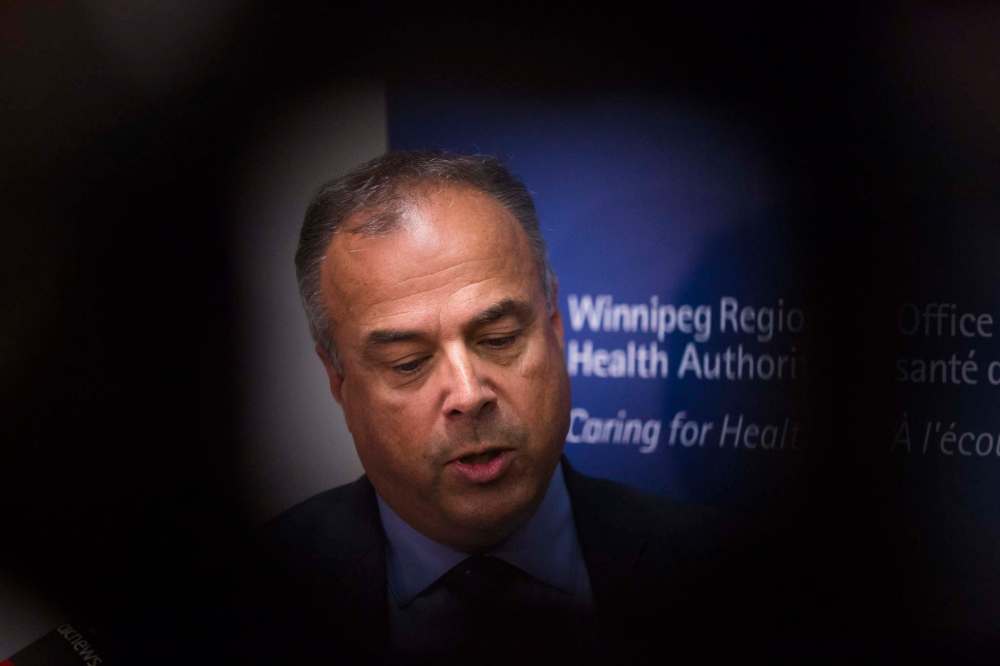WRHA executive had front-row seat to decades of change
Read this article for free:
or
Already have an account? Log in here »
To continue reading, please subscribe:
Monthly Digital Subscription
$0 for the first 4 weeks*
- Enjoy unlimited reading on winnipegfreepress.com
- Read the E-Edition, our digital replica newspaper
- Access News Break, our award-winning app
- Play interactive puzzles
*No charge for 4 weeks then price increases to the regular rate of $19.00 plus GST every four weeks. Offer available to new and qualified returning subscribers only. Cancel any time.
Monthly Digital Subscription
$4.75/week*
- Enjoy unlimited reading on winnipegfreepress.com
- Read the E-Edition, our digital replica newspaper
- Access News Break, our award-winning app
- Play interactive puzzles
*Billed as $19 plus GST every four weeks. Cancel any time.
To continue reading, please subscribe:
Add Free Press access to your Brandon Sun subscription for only an additional
$1 for the first 4 weeks*
*Your next subscription payment will increase by $1.00 and you will be charged $16.99 plus GST for four weeks. After four weeks, your payment will increase to $23.99 plus GST every four weeks.
Read unlimited articles for free today:
or
Already have an account? Log in here »
Hey there, time traveller!
This article was published 17/10/2019 (2246 days ago), so information in it may no longer be current.
Réal Cloutier is walking away from the helm of the Winnipeg Regional Health Authority with the confidence of knowing nobody is quite sure what to make of him or his reasons for leaving, as the city hospital system strains under the weight of profound change.
On the one hand, Cloutier, who announced his retirement Thursday, has been a critically important figure in the evolution of the Winnipeg health-care system, one of the architects of the WRHA and, for the last two years, it’s chief executive officer.

Over that time, Cloutier and a cast of others who came and went long before he did, ushered in a torrent of transformation — some good and some not so good.
Detractors will likely decry his time in charge and linger on things that are wrong with health care: long wait times for elective surgery and emergency department care; critical incidents; the recent battle between the WRHA and health-care professionals over the seismic reorganization of city hospitals.
So, how will we judge a man who has had a front-row seat to it all, in a career that spanned more than 30 years?
It is unfortunate no one thinks to create a running scoreboard for career public administrators who hang around long enough to see so much change. It might help the public fairly judge their service — something impossible to do while emotions continue to run high over the closure of three Winnipeg ERs.
WRHA boss to retire after hospital system overhaul

Posted:
The man who has led the Winnipeg Regional Health Authority during some of the most momentous changes in the city's hospital system has decided to retire.
Take the emotion away, however, and there are some undeniable facts about Cloutier and his time at the WRHA that deserve to be mentioned.
First, health care has been reinvented during Cloutier’s career. He was not an active participant in all changes, but he certainly got a good look at the landscape.
When Cloutier took on an upper-management role at what was then known as the Winnipeg Hospitals Authority in 1997, every hospital in the city was its own little fiefdom and made decisions independently on which clinical and surgical services it offered. For example, four different hospitals did cataract surgery; it was a system that was costly and inefficient.
With the WHA, Cloutier was part of a team that consolidated cataract surgeries in Misericordia Health Centre, a controversial decision at the time that now looks like a triumph of common sense.
So, how will we judge a man who has had a front-row seat to it all, in a career that spanned more than 30 years?
It was hardly the only change that took place in recent decades: more surgeries were done on an out-patient basis; diagnostic imaging exploded with the advent of CTs, MRIs and PET scanners; community health services offered outside of the hospital network proliferated; the authority massively expanded capacity to handle a growing and aging population with new and unforeseen medical challenges.
It wasn’t all good, but any individual complaints Winnipeggers have about the quality of health care should be judged against what was a constant state of change while bureaucrats such as Cloutier toiled in relative obscurity. Those complainants should also remember much of what gets blamed on the WRHA was in fact the result of provincial government policies.
Such as the decision of the current Progressive Conservative government to order the WRHA to trim $80 million from its operating budget and lay-off 15 per cent of its management staff, while also managing the reconfiguration of city hospitals. Any one of those directives would have been enough to occupy the capacity management; together, they represented a cruel and unusual task.
Which brings us to the ER closures. In an interview, Cloutier was careful to reiterate the whole plan to consolidate emergency medicine in three hospitals was devised by the WRHA, not the Tory government. Cloutier said other cities of similar and larger size were opting for a smaller roster of better-equipped ERs to handle emergent patients.
It is, in short, the way of things to come.
That does not mean the WRHA or Cloutier should be absolved of all responsibilities for the missteps in delivering that plan. Open warfare with nurses, many of whom have been unwilling or unable to relocate as their jobs have been shifted between hospitals, continues to threaten the viability of the new network.
The WRHA could have made the nurses more of an active participant in the planning of the reconfiguration. Instead, convinced they wouldn’t co-operate, Cloutier and the WRHA dictated terms to the Manitoba Nurses Union. The folly of that strategy can be seen in the shortages at consolidated ERs that are jacking up overtime to astronomical heights and putting patient care in the hands of an exhausted and exasperated nursing population.
That does not mean the WRHA or Cloutier should be absolved of all responsibilities for the missteps in delivering that plan.
Again, there is no running scoreboard to judge the value of work performed by career civil servants. That makes it exceedingly easy to focus solely on the negative, while ignoring the fact the gross majority of positive outcomes from the Winnipeg health-care system are never reported, discussed or considered by the naysayers.
Cloutier had a front-row seat to one of the most important eras in the evolution of health-care services in Manitoba. Notwithstanding the problems he saw, or may have caused, over the years, he leaves knowing one other inescapable fact: the system is in better shape than when he arrived.
dan.lett@freepress.mb.ca

Born and raised in and around Toronto, Dan Lett came to Winnipeg in 1986, less than a year out of journalism school with a lifelong dream to be a newspaper reporter.
Our newsroom depends on a growing audience of readers to power our journalism. If you are not a paid reader, please consider becoming a subscriber.
Our newsroom depends on its audience of readers to power our journalism. Thank you for your support.













